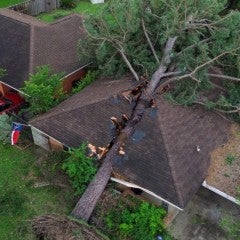Houston City Council members are expected to vote Wednesday on delivering $100 million in federal disaster aid to thousands of property owners hit by Hurricane Beryl and the May 2024 derecho. While the proposed allocation is significantly more than the city’s initial plan to give no money to property owners for repairs, it falls short of the federal government’s housing “unmet needs” estimate of $229 million.
Update, Aug. 14: Houston City Council approved plans to spend $100 million in federal disaster aid on housing in a 12-3 vote.
For Houston-area victims of the two storms, a wide gap remains between housing “unmet needs” and disaster aid from the U.S. Department of Housing and Urban Development allocated to property owners. Unmet needs are defined as the cost of remaining repairs not covered by insurance policies or previous government assistance, such as aid from the Federal Emergency Management Agency.
In Harris County, government officials expect to receive and distribute $47 million in HUD disaster relief aid for housing repairs, which will only cover a fraction of the estimated $568 million in unmet need.
The Texas General Land Office, which is administering federal aid for Montgomery, Fort Bend and 25 other hard-hit counties, plans to deliver $375 million in housing relief. That will cover less than half of the projected $915 million in need.
All three government entities are receiving additional millions in HUD relief that they’re spending on other expenses — such as upgrading emergency infrastructure and storm mitigation — to varying degrees. The city of Houston’s latest proposal would allocate roughly one-third of its HUD aid to housing.
Houston City Council Member Tiffany Thomas, the chair of the body’s housing and affordability committee, said there are still many homes in disrepair and residents in search of stability after the storm.
Mayor John Whitmire’s administration moved $50 million in disaster aid to housing after complaints from Thomas and some city advocates. Thomas then filed an amendment July 30 to allocate another $50 million for housing, which Whitmire said he supported.
“This is a step in the right direction, and it would be a missed opportunity for us to not invest in housing,” Thomas said in an interview.
Thomas said eligibility guidelines likely would be similar to the city’s repair program for Winter Storm Uri, which prioritized households at or below 80% of the area median income, with a resident who is disabled, or with a resident who is 62 or older.
'Continue to invest'
The Kinder Institute for Urban Research’s 2025 State of Housing in Harris County in Houston found that federal disaster aid is more frequently used in communities experiencing poverty, where residents often do not have the money or insurance to cover storm-related costs. Kinder Institute researchers found the highest density of Beryl-related requests through 311, the city of Houston’s help and information center, were in East Downtown, Kingwood, Second Ward, Settegast and Independence Heights.
“At a local level, our obligation to the city is we have to continue to invest in housing inventory, because it’s beyond an insecurity,” Thomas said. “We have constant federally declared disasters, but we also have to meet the moment with demand.”
The institute’s State of Housing report authors urged local government leaders to prioritize Houston’s most vulnerable communities for housing repairs and other storm preparedness work.
“Resiliency efforts should be targeted in these communities, including but not limited to proactive tree trimming, electrical grid strengthening, and repair assistance to buttress against storm damage,” the researchers said.
For housing advocates, the HUD funding is still significant, even if it doesn’t address every needed repair. Houston Habitat for Humanity CEO Allison Hay said the aid could represent an important step toward strengthening homes and making them more resilient to future storms.
“To have the greatest impact, these dollars can play a vital role in historically underserved neighborhoods — particularly where generational homes are at risk,” Hay said. “Investing in long-term, sustainable repairs isn’t just about fixing what’s broken. It’s about preparing for what’s next.”



